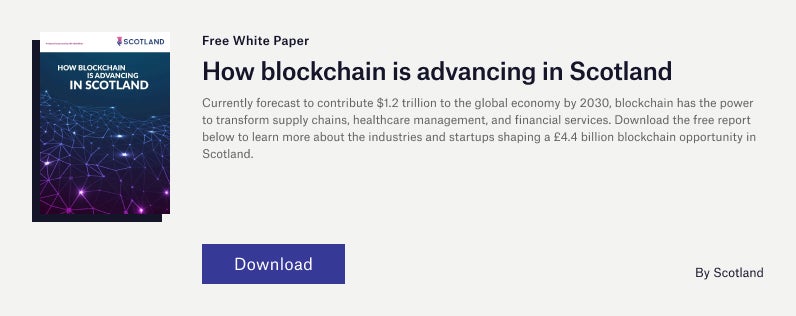
The global blockchain software and services market is predicted to reach $291bn in 2030, up from $12bn in 2023, according to GlobalData, with growing uses across a range of industries.
“The technology is starting to shape the way financial services are consumed and indeed developed, and when I say consumed, it is much more about the ability for consumers to engage with financial services,” says Nicola Anderson, CEO of FinTech Scotland. “In areas such as cryptocurrencies, younger consumers are very alert to that type of development.”

Access deeper industry intelligence
Experience unmatched clarity with a single platform that combines unique data, AI, and human expertise.

Given that blockchain has engaged young people and stakeholders across the financial services industry, its impact on the world of finance could be revolutionary. However, in spite of strong projections for market growth, questions remain over blockchain’s long-term viability, especially regarding its environmental impact.
Forward-thinking new enterprises such as Zumo, based in Scotland, are working hard to establish the credibility of blockchain and reduce its carbon footprint. Moreover, as a decentralised system, blockchain could be the key to creating transparency around sustainability.
However, for the technology to realise its full potential, it needs to be put into practice. Innovative use cases in Scotland are providing the ideal testing ground for proving the technology’s worth in a fast-changing financial services market.
Reducing blockchain’s carbon footprint
Research from Zumo and the Crypto Carbon Ratings Institute (CCRI) has found that, as of March 2024, the annualised carbon footprint of all physically backed bitcoin fund products stood at 4,487 kilotonnes of carbon dioxide, equivalent to a person flying from London to New York more than 1.5 million times. The carbon footprint of the industry is only growing as the market expands; for example, the London Stock Exchange welcomed Bitcoin exchange traded products (EPTs) in May 2024.
However, not all blockchains are as emissions-heavy as Bitcoin, which uses an energy-intense proof-of-work consensus mechanism. Less power-hungry consensus methods such as proof-of-stake (PoS) can significantly reduce blockchain emissions – Ethereum’s transition to PoS in 2022 cuts its energy consumption by over 99.9%. Moreover, a 2022 study from the Cambridge Centre for Alternative Finance found that renewable sources provided around 38% of the energy used for Bitcoin mining, a percentage that is on the increase.
A transition is under way in blockchain as the industry seeks to establish its environmental credentials without compromising its power for innovation. Nick Jones, CEO and co-founder of Zumo, an Edinburgh-based digital assets infrastructure platform focused on compliance and sustainability, notes: “The regulator in Europe, ESMA [European Securities and Markets Authority], has now introduced ESG [environmental, social and governance] disclosures for crypto-asset service providers and token issuers through its MiCA [Markets in Crypto Assets] regulation.
“However, we believe there is still much to do, and we invite companies active in the digital assets ecosystem to get in touch to discuss how they can align with their net-zero goals.”
How blockchain can improve transparency in sustainability
Accelerating a low-carbon future for blockchain is all the more essential as the technology holds great promise for improving environmental sustainability. With consumers more alert than ever to ‘greenwashing’ and false sustainability promises, blockchain could be the key to holding companies accountable and keeping them on-target. Blockchain provides a secure, transparent platform that can be used to track carbon emissions, facilitate waste management and protect natural resources.
Blockchain platforms such as Open Forest Protocol provide verification for reforestation and carbon capture initiatives. Additionally, in the carbon credit market, blockchain can tokenise and digitally distribute environmental assets. Since blockchain is decentralised in nature, the system is completely transparent, meaning transactions and exchanges can be meticulously recorded in a single framework that falls under the control of no one entity.
The repercussions of such a system on the framing of ESG targets and public accountability could be huge. “Blockchain brings an element of objectivity to the discussion,” Anderson points out.
As a member of the World Economic Forum’s Crypto Sustainability Coalition, Scottish company Zumo is committed to exploring how blockchain tools can be leveraged to support meaningful climate action. A report produced by the Coalition highlighted blockchain’s enormous potential to impact the energy sector positively.
“Blockchain is becoming an essential part of developing a carbon-neutral energy grid and has made it economically viable to invest in and build renewable energy power generation,” says Jones. “Sustainability and transparency are Zumo’s core values, and we are committed to publicly documenting our sustainability journey while also helping our partners in the industry with their own journeys.”
Scotland leads the way in blockchain use cases
Blockchain’s importance to the future of global sustainability is becoming clearer – but for it to become more widely used in financial systems, further investment is essential. One region expecting to maximise the benefits of blockchain is Scotland, whose Blockchain and Digital Trust Taskforce is building a road map for wider adoption across its native industries.
“The important thing is that we start to see relevant use cases for this technology,” explains Anderson. “Once we have use cases that are starting to progress, that will open up the conversation about the use of this technology and the development of much more progressive digital assets.”
Alongside a supportive leadership that encourages innovative uses of blockchain, Scotland boasts world-class academic institutions that are keen to create a different future for the financial services industry.
Jones relocated to Edinburgh to start Zumo. “Edinburgh has a rich heritage in computer science, with the city’s university among the top schools in Europe in terms of informatics,” he notes. “It responded quickly to the emergence of blockchain technology by offering new research opportunities and accelerator programmes.”
The strong working ties between the private sector, public sector and academia in Scotland make it a prime place to do business. Government initiatives such as FinTech Scotland’s Financial Regulation Innovation Lab, with which Zumo is involved, serve to strengthen these bonds and create a dynamic native business ecosystem.
“In Scotland, we have a really strong industry voice in our key sectors including financial services, energy and health,” says Anderson. “We can bring that industry experience into future opportunities for blockchain to focus on use cases and think carefully about where this tech can best be deployed.”
A small nation, but with strong links to global and retail banks, the Scottish financial services sector is an ideal place for blockchain businesses to network and establish themselves.
To learn more about the development of blockchain in Scotland, download the document below.
To stay updated on the progress and opportunities in Scotland or collaborate, visit Blockchain & Digital Trust Scotland.




